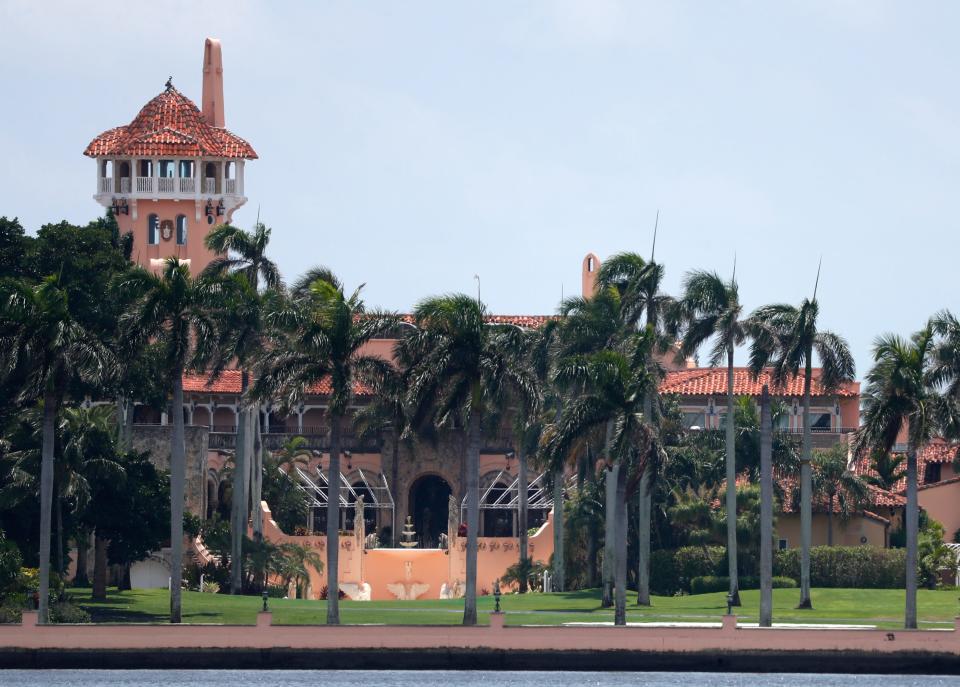Lack of details around FBI's search of Trump's home is maddening. It's also the process.
We've all watched the drill: televised news conferences where police officials say things like "No comment" or "This is an ongoing investigation so we will not be sharing specific details." I've covered hundreds in my career. I walk away with little to no new information and no ability to confirm the facts.
That is how federal, state and local law enforcement officials work: privately at first, as they're gathering evidence – executing search warrants, for example – and then sharing details publicly if and when they make their case.
Is it maddening? Of course. It's also the process.
The lack of official information around the FBI search of Donald Trump's home has Republicans going ballistic about a supposed politicized witch hunt and Democrats celebrating the idea that Trump will finally be held accountable.
Following the evidence, wherever it leads
We know from news accounts that the investigation is related to Trump's removal of classified documents from the White House. I don't accept for a second that Department of Justice and FBI officials entered Trump's home on a halfcocked conspiracy motivated by politics.

For the most part, that's not how law enforcement – particularly America's top law enforcement agency – handles such cases. They quietly go about their jobs by following the evidence, wherever it may lead.
Trump characterized the search as “prosecutorial misconduct” and the “weaponization of the Justice System.”
No. It's not.
'Defund the FBI': Trump supporters calmly react to Mar-a-Lago search
All in a day's work for law enforcement
This is what police officers, lawyers, prosecutors and judges do day after day. They investigate, interview potential witnesses, follow paper trails and use the constitutional mechanisms they are empowered with to bring justice to American citizens.

As Barbara McQuade, a former U.S. attorney for the Eastern District of Michigan so astutely wrote in a USA TODAY column:
"To search a residence, the Fourth Amendment to the Constitution requires the FBI to obtain a search warrant. Only a judge or magistrate can issue a search warrant. Before the judge may do so, he must find probable cause to believe that evidence of a crime will be found on the premises – not evidence of any crime, but of a specific crime spelled out in a detailed affidavit submitted and sworn to by a federal agent. This means that a judge found probable cause here that evidence of a crime – possibly the removed documents themselves – would be found at Mar-a-Lago."
What comes next could be huge: Why the FBI searching Trump's Mar-a-Lago home may be a sign of things to come
Law & order vs. answers now: We can't have it both ways
As a journalist, I want to see the warrant and any supporting affidavits in black and white. As an American, I also want answers. But there is a legal process – albeit frustrating – a window where we are kept in the dark until court documents and investigative reports are made available.
We can’t have it both ways. We demand that potential criminal activity be investigated by law enforcement based on credible suspicion. We demand that police and prosecutorial officials work for the greater good of our communities and our country. Calls for "law and order" reverberate. Yet here, we waffle.

America's legal system is far from perfect. The FBI is certainly fallible. But refusing to investigate Trump using all the legitimate tools available to law enforcement also would be viewed as political – as it should.
Let's wait for the facts
When Black people are killed by police officers, we're often implored not to jump to conclusions and to wait for all the facts to come out.
We watch. We mourn. We question why it happens again and again.
Trump's case shouldn't be any different. Former president or not, law enforcement deemed there was enough probable cause to go into Trump's home to look for evidence. Careful consideration on such a high-profile, unprecedented search had to be in play.
So let's wait.
National columnist/deputy opinion editor Suzette Hackney is a member of USA TODAY’S Editorial Board. Contact her at shackney@usatoday.com or on Twitter: @suzyscribe
You can read diverse opinions from our Board of Contributors and other writers on the Opinion front page, on Twitter @usatodayopinion and in our daily Opinion newsletter. To respond to a column, submit a comment to letters@usatoday.com.
This article originally appeared on USA TODAY: Trump's FBI search warrant is a mystery. We need to wait for answers

 Yahoo Movies
Yahoo Movies 